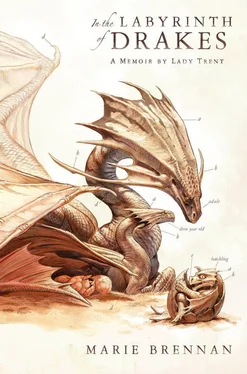“Moral of the story,” Andrew said when this was done. “If the dragon wakes up, run out instead of in .”
“Or else trust the clever slave-girl you meet along the way,” Tom said. “The bits where al-Sindi listens to her are the ones where he ends up alive and rich at the end.”
We did not find golden treasure in the drake’s cave, nor did we have to flee in any direction. So long as one moves quietly and does not tread upon the dragon’s tail, it is possible to get quite close to an estivating drake without disturbing it—even close enough to measure its rate of breathing. This, like all of the creature’s bodily functions, slows down tremendously during estivation, which is part of how they survive the summer months when food becomes more scarce.
My own breathing slowed down while I was inside, even though I knew that mere air was unlikely to wake the beast. Every sound seemed excessively loud: the scratch of my pencil, the shift of my feet on the stone, the quick beating of my heart. That latter even made me contemplate whether an ear trumpet would improve one’s hearing enough to measure heart rate as well: I was not quite foolhardy enough to try taking a sleeping dragon’s pulse directly.
Our party did not linger long, however, because we had another goal: a particular egg cache we had marked during the winter, which had been left untouched by the Aritat for this very purpose. It lay just outside the canyons and gullies of the Labyrinth of Drakes, and if the eggs hatched early enough, we might hope to find a second clutch in the area—I was personally hoping for one within the Labyrinth itself—and record that one, too.
Nature, however, was not inclined to oblige us.
* * *
It was a gusty day, which I found quite agreeable. The wind kicked up a good deal of grit, but it cooled me a little as well. So long as I kept my face turned away from the wind, the weather seemed a pleasant change of pace.
Our Akhian companions knew better. Al-Jelidah saw the warning signs first: a haze on the horizon, which grew with alarming speed. He spoke sharply to Suhail in the nomad dialect, and my husband’s face lost all its good humour on the spot. He began twisting in his saddle, looking in all directions—for what, I did not know.
“Is there a problem?” I asked.
“Sandstorm,” he said. “We have to find shelter.”
I knew of sandstorms, of course—but I knew of them in much the same way that I had known the Jefi was hot in summer. Intellectual understanding fell far short of the reality. I was bemused at the rapidity with which our party moved: following a hasty consultation, which revolved around whether we had time to reach a good place to make our stand, or must settle for a closer but less adequate option, we chivvied our camels into a gallop.
As fast as our beasts ran, the storm moved faster. By the time we reached a small hillock that dropped off in a rock face on the other side, the distant haze had become a distinct cloud. When I say “small,” I mean it very strictly: the bluff was scarcely a meter and a half high, and not long enough for all six of us. Suhail directed me to crouch at the base of the rock, with Tom and Andrew on either side of me and our camels so close that, were they prone to rolling, they might have crushed us. He and the other two Akhians reversed this ordering, crouching on the leeward side of their camels, for lack of any other shelter.
“Dab this inside your noses,” Suhail said, handing us the little jar of the grease we had been using to protect our lips. Mystified, we obeyed. “Now stuff your ears with these rags. Tie your scarves over your faces, as tightly as you can. Use extra scarves on your foreheads, low over your eyes—leave only the smallest slit. Tie them over your eyes, if you can endure a blindfold.”
When each of us finished this task, he tilted our heads backward enough for him to pour a few drops of water over our noses and mouths, wetting the fabric. Through the slit between my two scarves, I could see al-Jelidah and Haidar doing the same to themselves. “Keep your hands tucked inside your clothing,” Suhail added. “The wind may scour you bloody, otherwise.”
No more did he have time for. By then I could hear the strange, hissing roar of the wind—like other storms I have encountered, but with the alien touch of sand particles sliding over and past one another at tremendous speed. The light was beginning to turn red as the leading edges of the cloud eclipsed the sun. Suhail covered his own face with quick, practiced hands, and took shelter in the lee of his own camel.
Over the growing clamour, I shouted, “How long will we stay here?”
“Until the storm is gone!” Suhail shouted back.
I wanted to tell him that this was a singularly unhelpful answer. Of course we would remain there until the storm was gone; what I wanted to know was how long that would be. In my naivete, I did not realize that was the only answer he could give me… for a sandstorm may last anywhere from minutes to hours.
I cannot tell you how long we endured that one. What hour it had been when al-Jelidah saw the cloud, I do not recall; all I know is that much of the day was gone by the time we emerged. In between, there was misery.
A sandstorm assaults you, as even the most driving downpour does not. Rain sliding down the inside of your clothes is unpleasant, but it does not threaten to trap you, weighting your body while more piles up around you, pinning your legs. I saw at one point that my camel was periodically shifting, rising slightly from her couch to step free of the sand building around her; on the assumption that she knew better how to survive this weather than I did, I mimicked her.
Would that I had a camel’s ability to pinch my nostrils shut against the dust. Grit caked my scarf, and slipped through where I had not tucked the edges well enough; despite that protection, I found myself coughing out bitter masses, constantly feeling as if I could not get enough air. I learned soon enough why Suhail had directed us to grease our nostrils; without that, my skin would have cracked and bled.
I wished desperately that my husband were at my side. I knew why he was not: he was more accustomed to enduring such challenges than my Scirling companions, and so had given us what shelter the little bluff could provide. Much of the time I had my eyes closed anyway, to protect them against the scouring wind; when I opened them, I could scarcely make out Tom and Andrew through the red cloud. Suhail, on the far side of Tom, might as well have been in Vidwatha. But I would have derived comfort from seeing even his silhouette, as a reminder that such things could be endured.
The sound was ultimately the part I hated the most. It reminded me of the time in Bayembe when an insect had gotten inside my tent, and its buzzing threatened to drive me mad. This was worse, because it was deafening, and it went on for what seemed like an eternity. One of the scraps of rag stuffed into my ear fell out; attempting to replace it, I opened an unwise gap in the defense of my scarf, and nearly choked on dust. For the sake of my breathing, I left that ear unblocked, and the hissing roar of the wind was loud enough that I felt partially deaf on one side for some time after. Half deaf, half mad, I crouched between my camel and the stone, and prayed with unwonted fervor for this trial to end.
By the time it did, I had so lost all sense of reality that I did not trust it. Not until Suhail came and chivvied my camel to her feet did I believe we were safe, that the blue sky clearing above was not some hallucination.
When I stood, sand cascaded from every fold of my clothes, inside and out. The skin of my face stung as I unwrapped the two scarves; peeling them away, I saw that their edges were daubed with blood. The gap between them, narrow as it was, had allowed the wind to score my skin, flaying the top layers. Suhail bore similar marks. He wet a rag and offered it to me; my breath hissed between my teeth as I cleaned the area of grit.
Читать дальше












